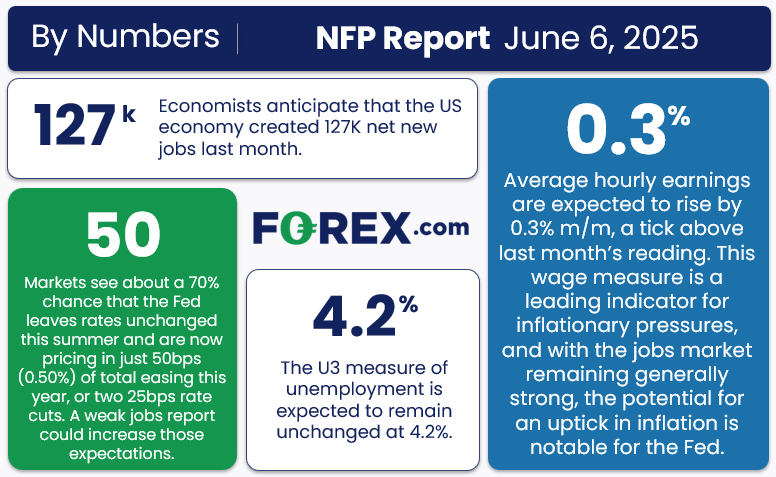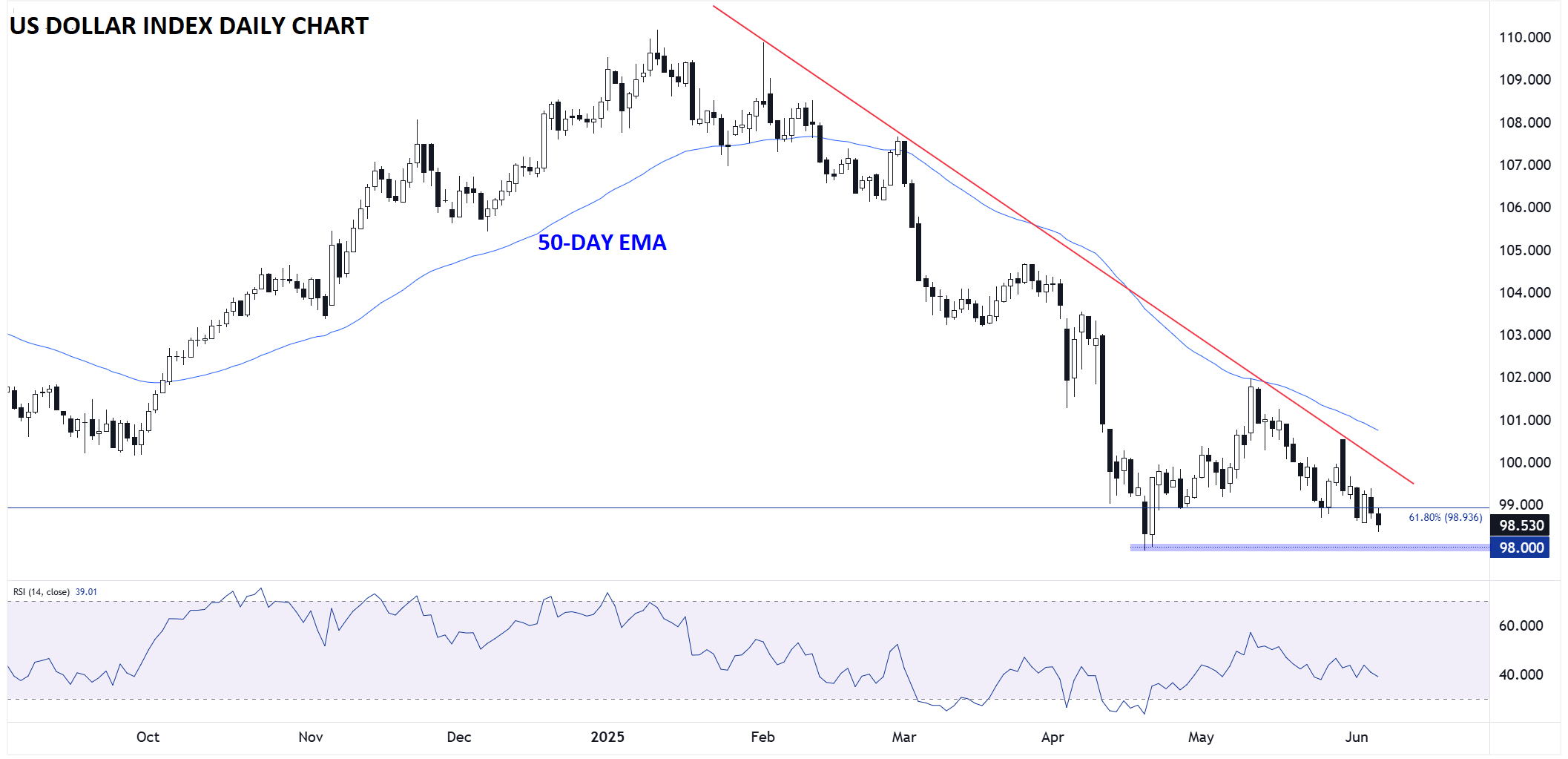
NFP Key Points
- NFP report expectations: +127K jobs, +0.3% m/m earnings, unemployment at 4.2%
- Leading indicators point to near-expectation reading in this month’s NFP report, with headline job growth potentially coming in somewhere in the 115-150K range.
- Even if we do see a US dollar bounce on a stronger-than-anticipated jobs report, bears may look to sell any rallies to join the ongoing downtrend at a more favorable price.
When is the May NFP Report?
The May NFP report will be released on Friday, June 6, at 8:30 ET.
NFP Report Expectations
Traders and economists expect the NFP report to show that the US created 127K net new jobs, with average hourly earnings rising 0.3% m/m (3.7% y/y) and the U3 unemployment rate holding steady at 4.2%.
NFP Overview
After years of consistent strength, there are finally early signs of cracks in the US labor market.
In addition the classic U3 unemployment rate nearing its highest level in 2.5 years, we’ve also seen a deterioration in the ADP employment report, an uptick in initial unemployment claims, and persistently high continuing claims figures, signaling that while layoffs haven’t necessarily surged, it’s increasingly difficult for unemployed workers to secure a new job. Employment is classically a lagging indicator for the underlying performance of the economy, but if that lagging indicator starts to deteriorate this summer, it could cement a slowdown into the second half of the year.
When it comes to this month’s jobs report, expectations are for +127K jobs, with the unemployment rate to hold steady at 4.2%. One key area to watch will be the average hourly earnings measure, which is expected to come in unchanged from last month at 0.3% m/m:

Source: StoneX
As the lower left box below suggests, traders now expect just two interest rate cuts from the Federal Reserve this year, though the central bank is likely to remain on hold through the summer barring a huge surprise.
NFP Forecast
As regular readers know, we focus on four historically reliable leading indicators to help handicap each month’s NFP report:
- The ISM Services PMI Employment component improved modestly to 50.7 from 49.0 last month.
- The ISM Manufacturing PMI Employment component held steady at 46.8 from last month’s 46.5 reading.
- The ADP Employment report showed just 37K net new jobs, down from last month’s 60K print.
- Finally, the 4-week moving average of initial unemployment claims ticked up to 235K, up from last months 226K reading.
Weighing the data and our internal models, the leading indicators point to a near-expectations reading in this month’s NFP report, with headline job growth potentially coming in somewhere in the 115-150K range, albeit with a big band of uncertainty given the current global backdrop.
Regardless, the month-to-month fluctuations in this report are notoriously difficult to predict, so we wouldn’t put too much stock into any forecasts (including ours). As always, the other aspects of the release, prominently including the closely-watched average hourly earnings figure which came in at 0.2% m/m in the most recent NFP report.
Potential NFP Market Reaction
|
|
Wages < 0.2% m/m |
Wages 0.2-0.4% m/m |
Wages > 0.4% m/m |
|
< 100K jobs |
Strongly Bearish USD |
Bearish USD |
Bearish USD |
|
100-150K jobs |
Slightly Bearish USD |
Slightly Bearish USD |
Neutral USD |
|
> 150K jobs |
Neutral USD |
Slightly Bullish USD |
Bullish USD |
As we outline below, the US Dollar Index (DXY) has seen its counter-trend bounce peter out, and the world’s reserve currency could be poised to extend its downtrend to 3+ year lows if the labor market deteriorates further.
US Dollar Technical Analysis – DXY Daily Chart

Source: TradingView, StoneX
The US Dollar Index (DXY) bounced through the first half of May before rolling back above to approach 3+ year lows near 98.00 as we go to press. The counter-trend bounce alleviated the oversold condition on the 14-day RSI, potentially setting the stage for another leg lower, especially if the jobs report comes in weaker than anticipated. While the jobs market is likely to be increasingly important in driving the Federal Reserve’s decisions as we move through the year, tariff headlines and any potential trade deals (especially with China) may be bigger market movers in the near term.
Technically speaking, the April low around 98.00 is the most important support level to watch, whereas the nearest clear level of topside resistance comes from the descending bearish trend line closer to 100.00. Even if we do see a bounce on a stronger-than-anticipated jobs report, bears may look to sell any rallies to join the ongoing downtrend at a more favorable price.
-- Written by Matt Weller, Global Head of Research
Follow Matt on Twitter: @MWellerFX






